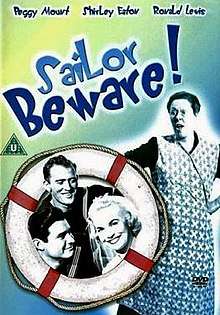Sailor Beware! (1956 film)
Sailor Beware! is a 1956 British romantic comedy film directed by Gordon Parry. It was released as Panic in the Parlor in the United States.
| Sailor Beware! | |
|---|---|
 DVD cover | |
| Directed by | Gordon Parry |
| Produced by | Jack Clayton |
| Written by | Falkland Cary Philip King |
| Starring | Peggy Mount Shirley Eaton Ronald Lewis |
Production company | Remus Films Romulus Films |
| Distributed by | Independent Film Dist. (UK) Distributors Corporation of America (US) |
Release date |
|
Running time | 81 minutes |
| Country | United Kingdom |
| Language | English |
| Box office | £221,779 (UK)[1] |
The film is an adaptation of the successful stage play of the same name. It follows the story of a sailor betrothed to be married, but wary that home-life may echo that of her parents: a hen-pecked husband and battle-axe mother.
It is one of Michael Caine's first films; he has a small, uncredited role as a sailor.[2]
Plot
Royal Navy sailor Albert Tufnell is to marry Shirley Hornett the next day. He and his best man, fellow sailor Carnoustie Bligh, travel to the Hornett household.
However, Albert begins to have second thoughts when he spends the day with her family. He has no problem with her father Henry or with meek spinster aunt Edie, but her domineering mother Emma is another matter entirely. (Meanwhile, Carnoustie and Shirley's beautiful cousin Daphne Pink are attracted to each other.) When Albert announces that he and Carnoustie are going to see their pals that night, Emma objects strenuously, as does Shirley, but they go anyway. Later, Emma sends Henry to fetch them, but it is they who have to bring back a thoroughly drunk Henry.
Edie lets slip plans for the couple to live in a house three doors away, plans made without consulting the bridegroom. Albert gives Shirley a chance to inform him, but she does not do so, which concerns him.
The day of the wedding, Albert does not appear at the church, so the Hornetts go home. Then Albert shows up, as does the Reverend Purefoy, who was to preside over the ceremony. Albert states that he loves Shirley and wants to marry her. However, he has his doubts. Mr. Purefoy asks to speak to the couple privately. Everyone else leaves the room (but eavesdrops). Albert then explains that the unhappy example of her family life and the unilateral decision about where they were to live have made him hesitate. Henry comes in and surprisingly states that his wife has actually taken good care of him, and that he is fond of her. Upon hearing that, Emma breaks down and weeps; she tells Purefoy she wants to change her ways. Albert marries Shirley, but after they leave, Emma finds it hard to break old habits.
Cast
- Peggy Mount as Emma Hornett
- Shirley Eaton as Shirley Hornett
- Ronald Lewis as Albert Tufnell
- Cyril Smith as Henry Hornett
- Esma Cannon as Edie Hornett
- Gordon Jackson as Carnoustie Bligh
- Geoffrey Keen as the Rev. Purefoy
- Joy Webster as Daphne Pink
- Thora Hird as Mrs. Lack
- Eliot Makeham as Uncle Brummell
- Fred Griffiths as Taxi Driver
- Edie Martin as Little Woman in Church
- Margaret Moore as Little Girl
- Barbara Hicks as Little Girl's Mother
- George Rose as Waiter at Banfield's
- Frank Atkinson as Chauffeur (uncredited)
- Alfie Bass as Organist (uncredited)
- Richard Beynon as Bearded Sailor (uncredited)
- Douglas Blackwell as Co-op Man (uncredited)
- Anne Blake (uncredited)
- Michael Caine as Sailor (uncredited)
- Peter Collingwood as Verger (uncredited)
- George A. Cooper as Petty Officer (uncredited)
- Paul Eddington as Bearded Sailor (uncredited)
- Charles Houston (uncredited)
- Jack MacGowran as Toddy (uncredited)
- Henry McGee as Milkman (uncredited)
- John Pike as Bit Part (uncredited)
- Anthony Sagar as Naval Rating (uncredited)
Reception
The film was one of the ten most popular films at the British box office in 1956.[3]
References
- Vincent Porter, 'The Robert Clark Account', Historical Journal of Film, Radio and Television, Vol 20 No 4, 2000 p509
- "Michael Caine", The Times, 28 March 2000, p. 7
- BRITISH. FILMS MADE MOST MONEY: BOX-OFFICE SURVEY The Manchester Guardian (1901-1959) [Manchester (UK)] 28 Dec 1956: 3